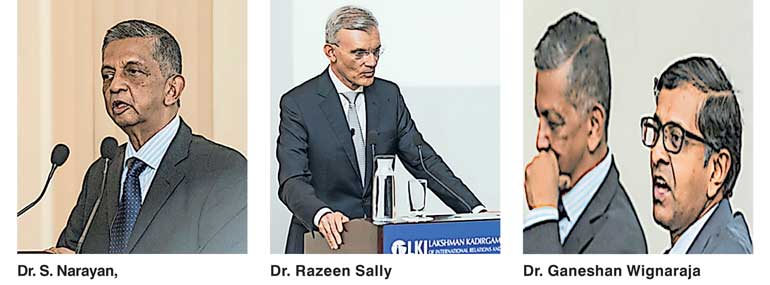Monday Feb 23, 2026
Monday Feb 23, 2026
Thursday, 30 November 2017 00:56 - - {{hitsCtrl.values.hits}}


The Lakshman Kadirgamar Institute of International Relations and Strategic Studies (LKI) and the Institute of Policy Studies of Sri Lanka (IPS) hosted their first joint lecture, featuring Dr. S. Narayan, former Finance Secretary of India, who spoke on ‘India-Sri Lanka Economic Relations in Modi’s India’.
The lecture was held on 20 November, and was followed by an expert panel discussion featuring Dr. Razeen Sally, Associate Professor at the Lee Kuan Yew School of Public Policy at the National University of Singapore and Chairman of IPS. The discussion was moderated by Dr. Ganeshan Wignaraja, Chair of the Global Economy Programme at LKI.
Trade, foreign policy
and Indian economy
Dr. Narayan focused on three significant topics: trade, foreign policy and the Indian economy in the age of Prime Minister Modi. Although Sri Lankan businesses are making significant headway in the Indian economy, he emphasised the importance of expanding trade relations beyond Tamil Nadu, stating that “today, the opportunities in South Indian states are much more… there is an opportunity to say South India no longer means Tamil Nadu to the exclusion of everybody else.” Dr. Narayan also argued for the formalisation of informal trade, as this sector presents a growth opportunity in marketable goods. He stressed that it was crucial to “move the discussion away from the larger picture to the more business picture, and to deal with issues which are facing businesses and not issues which are facing governments”.
Bilateral trade deficit
Dr. Razeen Sally of IPS spoke about the bilateral trade deficit between India and Sri Lanka, stating that the existence of this deficit is not necessarily negative for Indo-Lanka relations. He argued that, despite perceptions fuelled by the local media, the trade deficit is not caused by unfair trade practices on India’s part, and that “the arguments that the trade deficit is bad are, of course, economically illiterate arguments.” Instead, Dr. Sally emphasised that domestic barriers in Sri Lanka affect export potential.
He also highlighted that creating a domestic reform agenda favouring unilateral trade liberalisation and fostering domestic competitiveness would encourage foreign direct investment in the Sri Lankan economy.
Indian involvement
in infrastructure
Dr. Ganeshan Wignaraja noted that warming political ties between Sri Lanka and India since 2015 had supported Indian involvement in some infrastructure projects in Sri Lanka, including the Mattala Airport and Trincomalee urban development. He suggested that improved bilateral trade and FDI flows could arise from the close geographical proximity of the two countries. Dr. Wignaraja mentioned that trade remedies can reduce risks linked to sudden import surges. The high-profile event drew a diverse group of participants, including policy makers, scholars from universities and think tanks, media, representatives from the private sector and civil society and students. Participants had the opportunity to ask questions, and engage in a broader discussion of the future prospects of Indo-Lanka relations. LKI is a think tank which analyses Sri Lanka’s international relations and strategic interests, to provide insights and recommendations that advance justice, peace, prosperity and sustainability. It reflects the vision of the late Lakshman Kadirgamar by promoting the country’s intellectual profile in foreign policy research and engagement.
IPS is an autonomous economic research organisation, established by an Act of Parliament. The Institute aims to promote policy-oriented economic research to strengthen the capacity for medium-term policy analysis in Sri Lanka. More information is available at www.lki.lk.